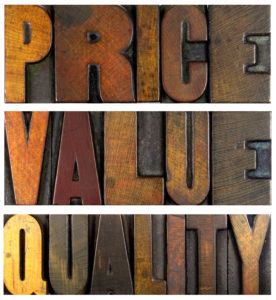 So you have a project that’s part of a bigger job, or an individual piece that you want made…maybe it’s just an idea. You probably want to know how much it will cost to determine if it meets your budget.
So you have a project that’s part of a bigger job, or an individual piece that you want made…maybe it’s just an idea. You probably want to know how much it will cost to determine if it meets your budget.
The reality is, the price of any given item has to meet the budget somewhere, somehow. Rest assured everyone, and every job, has a budget no matter how big or small. In the event that there is no stated budget, the fact remains that individuals have a value for money threshold on everything. This is to say they will only pay so much for any given thing and have to see the value in it which is a defacto budget.
A price quote is an exact price with specifications and parameters spelled out so you can know just what that something will cost. You have to be able to provide some real information to expect a ‘price quote’. No one can tell you how much it will cost unless they know exactly what it is. Once you provide the details, it is completely reasonable for you to expect the price to vary if changes, additions or deletions are made upon ordering. The benefit of a price quote is the ability to do price comparison with other suppliers and that is where clear specifications are important. The ‘apples to apples’ principle makes it easy to see who has the best price but often it is difficult to sort through if clear specifications are not given. Vague or unclear instructions result in speculation of what the project actually is. The clearer your specifications, the better chance you have of receiving an accurate price. If when reviewing several quotes there is one substantially lower than the others, it should raise questions as to why that is, rather than an opportunity to save money. It may result in an inferior product.
A budget price is often just as valuable a piece of information as a price quote depending on the available information. If you know your budget, share it when asking for a price. This will help someone understand what you can get to fit your budget. This will also provide an opportunity for value engineering, which means making changes that create a value for money proposition to best suit your budget.
If it is a budget price, or a quoted price, one must always realize that the only real way to get significant reduction in price is to reduce the quantity, size or change some specification. If someone can reduce the price when asked without changing any of these, then they were asking too much in the first place and it would be good advice to avoid this provider. There is just no real way for a price to be reduced on a given product unless the price was too high in the beginning.
If the price you receive is too high and you have three quotes or budget prices that are all similar, then the project clearly doesn’t meet your budget. The pursuit of a lower price for the same item has the risk of providing you with a substandard product that will not meet your needs or fail in service.
We have a saying at River City Woodworks, “There is never enough money to do it right, but always enough to do it twice.” and while everyone doesn’t think this funny, we consider it sage advice. In the words of John Ruskin, a prominent social thinker of the 19th Century.
“It’s unwise to pay too much, but it’s worse to pay too little. When you pay too much, you lose a little money – that’s all. When you pay too little, you sometimes lose everything, because the thing you bought was incapable of doing the thing it was bought to do. The common law of business balance prohibits paying a little and getting a lot – it can’t be done. If you deal with the lowest bidder, it is well to add something for the risk you run, and if you do that you will have enough to pay for something better.”
So after all that, how do you get a real price for what you need or want? First, research providers of the product. Contact them to discuss your project. Share your budget with them. Let them help you come up with a solution so you can get the most value for your money. Request a fixed price for the specifications you have discussed.
Trust is everything and your research should help you find reliable trustworthy sources who will help you get what you truly need and be there for you in the future. A low cost provider will often have an unsupported warranty or poor follow-up. If you are shopping for a given product, piece of tooling or equipment that is standard, it is worth looking around for the best price but always remember to think about future support if you encounter problems. Who will come to service the product or how will you get it to service? These are things to consider in the price and play into the value for money proposition.
